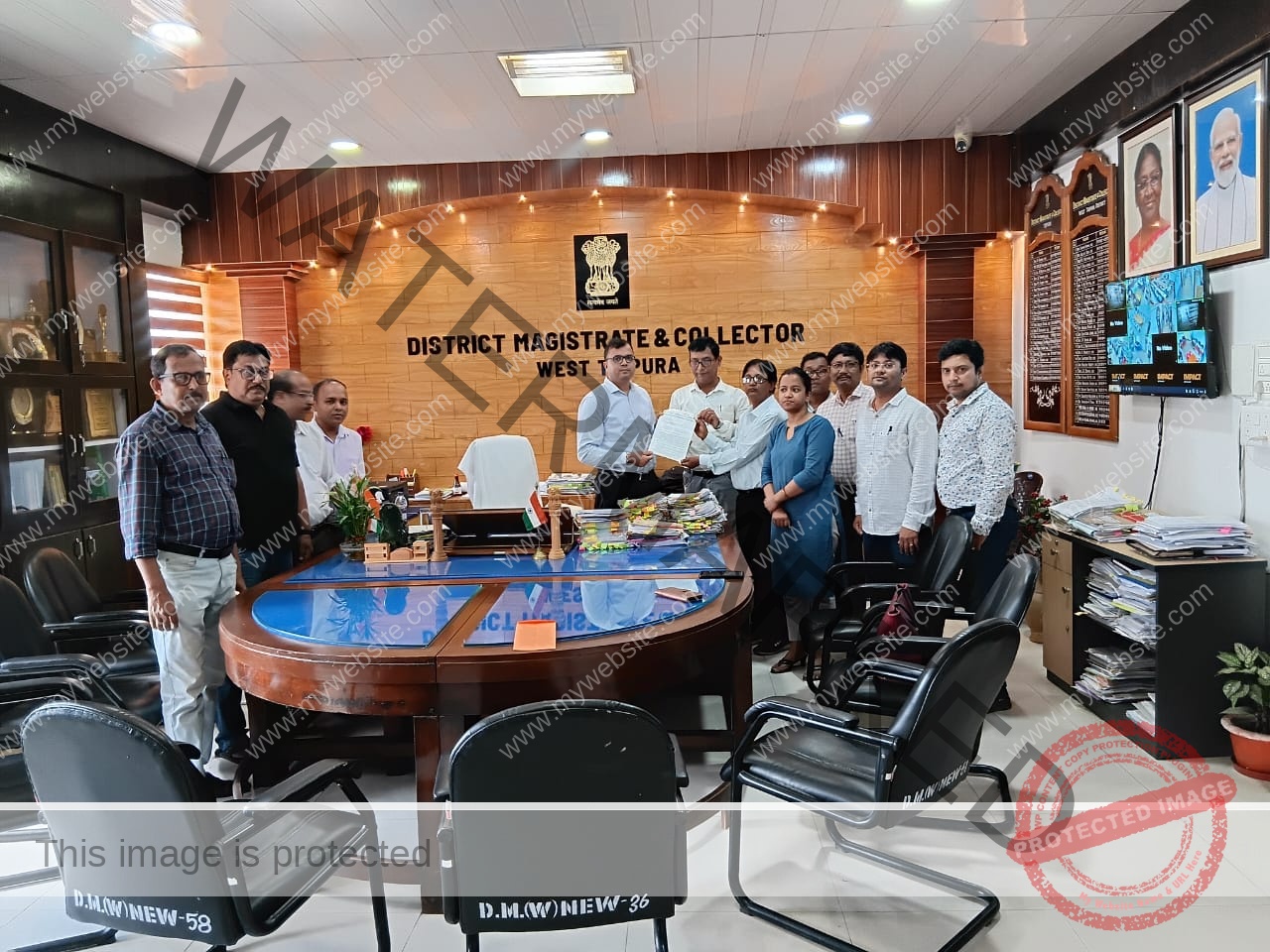
Union Delegation Submits Memorandum to Prime Minister for Government Employee Reforms
Agartala, 4th July 2025 — A coalition of state government employees in Tripura has escalated their demands for systemic reforms by submitting a formal memorandum to Prime Minister Narendra Modi. The initiative, led by the Tripura Rajya Karmachari Sangh in collaboration with the Government Employees National Confederation (GENC) and Bharatiya Mazdoor Sangh (BMS), highlights critical issues affecting public sector workers across the state. The delegation, comprising senior union leaders and representatives, requested the District Magistrate of West Tripura to forward their grievances to the Prime Minister’s Office, emphasizing the urgency of resolving long-standing concerns.
The memorandum underscores the need for immediate action on multiple fronts, including the establishment of the 8th Central Pay Commission, which has been delayed since its anticipated announcement in January 2025. Union leaders argue that delayed reforms are compromising the financial stability and morale of government employees, many of whom face stagnant wages and inadequate benefits. This campaign reflects a broader national movement for equitable treatment of public sector workers, with Tripura’s delegation serving as a pivotal voice in the dialogue.
Key Demands Focus on Equity, Benefits, and Pension Reforms
The memorandum outlines a comprehensive list of demands aimed at addressing systemic inequities within the public sector. Central to these requests is the implementation of equal pay for equal work across all state government employees, a policy that has been repeatedly advocated by labor unions nationwide. Additionally, the delegation calls for the automatic extension of court-ordered benefits to employees in similar positions, ensuring that legal protections are not selectively applied.
Another major demand is the restoration of the Old Pension Scheme (OPS) in place of the National Pension Scheme (NPS/UPS). Union leaders argue that the OPS offers greater financial security for retirees, particularly given the rising cost of living. The memorandum also seeks an increase in group insurance coverage to ₹20 lakh, a measure that could significantly enhance healthcare accessibility for employees and their families. Addressing the issue of long-pending vacancies and ensuring five promotions during an employee’s service tenure are also critical components of the union’s agenda.
Leaders Stress Urgency of Resolving Employee Welfare Concerns
Speaking to the media, Partha Pal, President of the Tripura Rajya Karmachari Sangh, emphasized the legitimacy of the union’s demands, which he described as long-overdue and essential for maintaining the dignity of government workers. Pal’s comments reflect a broader sentiment among labor leaders who argue that unresolved grievances are eroding public trust in the government’s commitment to employee welfare.
The delegation’s call for swift action underscores the growing pressure on policymakers to prioritize the concerns of public sector workers. With the 8th Central Pay Commission’s delay exacerbating financial stress for many employees, the union’s request for immediate intervention highlights the intersection of labor rights and economic stability. As the memorandum awaits review by the Prime Minister’s Office, the outcome could set a precedent for similar demands in other states, particularly those with comparable challenges in pension and pay reform.
Broader Implications for State and Central Government Policies
The Tripura delegation’s memorandum is part of a larger national discourse on the welfare of government employees, with implications for both state and central policies. The demand for the 8th Central Pay Commission’s establishment reflects a longstanding gap in the pay structure for central and state government workers, a issue that has sparked widespread protests and legal challenges. By focusing on equitable treatment and financial security, the union’s agenda aligns with broader labor movements advocating for systemic change in public sector employment.
The push for the restoration of the OPS and increased insurance coverage also highlights the need for a reevaluation of retirement benefits in an era of economic uncertainty. As the government grapples with balancing fiscal responsibility and employee welfare, the Tripura case serves as a critical test of its commitment to addressing the concerns of public sector workers. The resolution of these demands could influence future policy decisions, particularly in states facing similar challenges with pension and pay reforms.
Call for Transparency and Accountability in Government Reforms
Union leaders have expressed hope that the Prime Minister’s Office will prioritize the memorandum’s recommendations, recognizing the potential impact on the livelihoods of thousands of employees. The delegation’s emphasis on transparency and accountability in the reform process reflects a growing demand for government responsiveness to labor concerns. As the memorandum is forwarded for review, the outcome will likely shape the trajectory of future negotiations between labor unions and policymakers.
The Tripura case exemplifies the complex interplay between state-specific challenges and national labor policies. With the 8th Central Pay Commission’s delay continuing to affect employees, the urgency for resolution has never been clearer. As the nation awaits a response, the delegation’s call for action underscores the critical role of public sector workers in the country’s economic and social fabric. The coming weeks will be pivotal in determining whether the government can meet the expectations of its employees and restore faith in the reform process.



